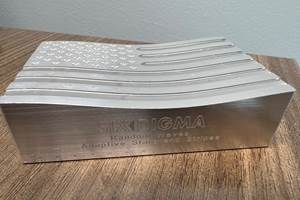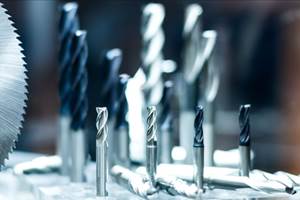Six Ways Outsourced Maintenance Saves
Outsourcing maintenance to a third-party specialist can be a cost-effective way to realize higher overall equipment efficiency and better process control.
Share





With today's limited internal resources, it's tough to transform machine maintenance from reactionary to preventive maintenance, and ultimately to proactive maintenance, despite the obvious upsides in higher overall equipment efficiency, better process control and lower total cost. Outsourcing this requirement to a third-party specialist, however, is a cost-effective alternative, according to companies that have crunched the numbers.
Lockheed Martin offers a case in point. The company has contracted with MAG for global service and support of machining equipment and systems at all its major plant locations around the world. The comprehensive agreement provides interactive diagnostic help, preventive maintenance, field service, training, replacement and spare parts, productivity improvements, machine rebuilding, and even machine and system relocation and set-up.
Manufacturers of all sizes—from single plant to multi-plant and multi-national—can benefit from outsourced maintenance to improve productivity and competitiveness. There are six primary areas where a single-source maintenance partner can optimize the capital investment and provide cost savings through lower total cost of ownership and increased return on investment.
1. Application Support
Machine tool experts can analyze the tasks assigned to each machine and provide recommendations on process improvements, cycle-time reduction strategies, proper cutting tools and workholding configurations to optimize machine usage and performance, and reduce work in process, setup times and costs per part.
2. Training
Knowledge is power, and knowledgeable operators are key to maximizing the production power of your machines. Ensuring your personnel are trained on the latest operation and maintenance developments and techniques is critical to getting the most out of your machine tools. Training can be individualized and conducted on-line for further cost savings.
3. Service Support
When a machine goes down it immediately transforms from income generator to expense. Timely service support is the key to getting the machine back online and making parts. At times when on-site maintenance is cost- or time-prohibitive, interactive tech support, via video, voice and data communications over a standard phone line, can quickly diagnose problems remotely for faster service and less downtime.
4. Preventive Maintenance
Knowing what areas of the machine need preventive maintenance, and what level is cost-effective, are part of the support partner's holistic services. A supplier that has wide experience with many makes and kinds of machine tools will know the typical service life of various components and potential weak spots or problem areas with certain designs. This enables closer monitoring, trend tracking, and appropriately scheduled maintenance to prevent costly downtime. Also, coordinated "ganging" of service to multiple machines can produce significant economies of scale.
5. Machine Monitoring
Trends in production monitoring are moving rapidly from machine-level to process-level intelligence, and real-time performance management from a service/support partner can optimize equipment utilization for greater manufacturing efficiency and ROI. Computer-enabled data collection tools identify and resolve out-of-cycle events as they are happening, and provide interactive, on-demand reporting of production equipment availability, utilization and performance.
6. Spindle Replacement
For plants operating high-volume machining systems, such as in the automotive sector, the service/support partner can take complete responsibility for spindle inventory and replacement, often working with a third-party spindle re-conditioner for new or rebuilt units, reducing turn-around time to hours instead of days. At the same time, small-volume, high-value part manufacturers can’t afford to let the huge overhead of a giant gantry machine (both physical and financial) sit dormant, meaning fast response to spindle or gear box replacement needs is critical.
Bonus: Machine Certifications and More
Service/support partners can also assist with machine certifications after a relocation or in-plant re-assignment. This may include inspection of axis alignment, coolant/lube systems, toolchangers, and automation, as well as laser calibration, ballbar testing and axis alignment. The goal is to ensure the machine meets or exceeds OEM specs, and can make quality parts per the program/contract requirements and ISO 9000 or other standards.
A support partner can also provide consultation on control retrofits, mechanical rebuilds, and machine reassignments—analyzing the benefit to productivity and the impact on operations the changes may have. This allows you to see the "big picture" and thoroughly understand the condition of the equipment before investing in updating, rebuilding or relocating it.
Working with a single-source maintenance provider is an economical way to ensure you are getting the most from your machines, operating at your highest possible efficiency and poised to handle changes to, and adaptations for, future operations.
Related Content
Shop Tour Video: You've Never Seen a Manufacturing Facility Like This
In the latest installment of our “View From My Shop” series, explore Marathon Precision’s multi-process approach to manufacturing, where blacksmiths and hand-forged dies meet state-of-the-art CNC machining. Discover how restoring classic muscle cars and building custom art projects creates a dynamic shop culture — and draws top talent to this unique and innovative metalworking facility.
Read MoreManufacturing Technology and Training in Europe
NTMA’s European Tech Tour exposed attendees to the latest technology and traditional training methods used by European manufacturers.
Read MoreBuilding Machines and Apprenticeships In-House: 5-Axis Live
Universal machines were the main draw of Grob’s 5-Axis Live — though the company’s apprenticeship and support proved equally impressive.
Read MoreAddressing the Manufacturing Labor Shortage Needs to Start Here
Student-run businesses focused on technical training for the trades are taking root across the U.S. Can we — should we — leverage their regional successes into a nationwide platform?
Read MoreRead Next
AMRs Are Moving Into Manufacturing: 4 Considerations for Implementation
AMRs can provide a flexible, easy-to-use automation platform so long as manufacturers choose a suitable task and prepare their facilities.
Read MoreLast Chance! 2025 Top Shops Benchmarking Survey Still Open Through April 30
Don’t miss out! 91ÊÓƵÍøÕ¾ÎÛ's Top Shops Benchmarking Survey is still open — but not for long. This is your last chance to a receive free, customized benchmarking report that includes actionable feedback across several shopfloor and business metrics.
Read MoreMachine Shop MBA
Making Chips and 91ÊÓƵÍøÕ¾ÎÛ are teaming up for a new podcast series called Machine Shop MBA—designed to help manufacturers measure their success against the industry’s best. Through the lens of the Top Shops benchmarking program, the series explores the KPIs that set high-performing shops apart, from machine utilization and first-pass yield to employee engagement and revenue per employee.
Read More





















